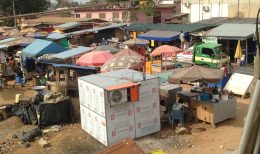Most rural dwellers in Ghana rely on farming for their livelihoods, but post-harvest losses (PHL) between the act of harvesting to the stage of consumption greatly hinder their progress and reduce their earnings. Official figures show that smallholder farmers experience as high as 30 per cent PHL through spoilage or theft, costing the country € 700,000 annually.
Siabi Paul Senaye, the Founder and CEO of WorldTech Consult, saw an opportunity to make a difference. The company designs, manufactures and installs solar-powered, walk-in cold rooms that extend the shelf life of perishables.
The company rolled out the EcoRecharge Coldroom in 2020 to help reduce PHL, increase net income for small-scale farm operators, create jobs for young people and reduce the carbon footprint of local communities.
“We came up with this solution because of the lack of cold storage facilities in rural areas, which contributes to post-harvest losses of fruits, vegetables and other perishables. There is also a lack of reliable electricity, which is why our cold rooms are solar-powered,” said Senaye.
Senaye was one of 15 entrepreneurs selected from an application pool of nearly 700 start-ups who participated in the Africa ClimAccelerator – first pan-African accelerator focused on scaling the most promising climate-focused innovations.
The remote-controlled EcoRecharge Coldrooms are portable, mobile and practical for hot and humid rural areas where farmers have long resigned themselves to the fate of losing their produce or selling it at miniscule prices. All perishable items are stored in reusable vegetable crates as opposed to wooden ones.

“We offer a flexible pay-as-you-store subscription model to small-scale farmers, who pay $ 0.33 for each reusable vegetable crate per night. Their produce is labelled, stacked and kept in our crates, which greatly increases the shelf life. This means they don’t have to hire out an entire cold room,” said Senaye.
Over the past two years, WorldTech Consult has installed three cold rooms with 65 more under construction – of which 20 are reserved for the German Agency for International Co-operation (‘GIZ’). One cold room costs $ 23,000 and can be highly customised based on customers’ specifications.
The company plans to scale up its operations by partnering with other government institutions, NGOs, investors, donors, corporates and farmer groups as it continues to reduce the carbon footprint of local communities by eliminating food waste while boosting the incomes of smallholder farmers.
The Africa ClimAccelerator was designed to enhance the development and deployment of innovative technology to accelerate climate-positive business solutions for a net-zero Africa. From January to June 2022, programme was delivered by partner organisations GrowthAfrica and the Carbon Trust, supported by the Climate-KIC International Foundation and funded by the German Corporation for International Cooperation GmbH (‘GIZ’) exclusively on behalf of the German Federal Ministry for Economic Cooperation and Development (‘BMZ’).
An original version of this article was published here on 25 April.

